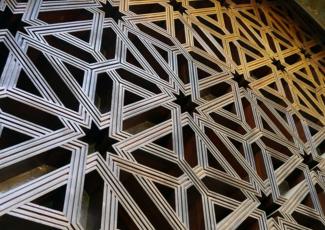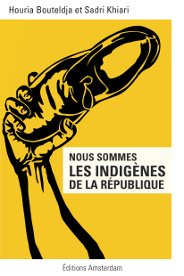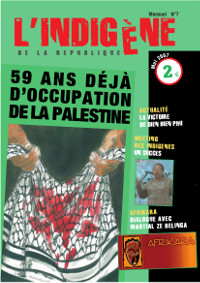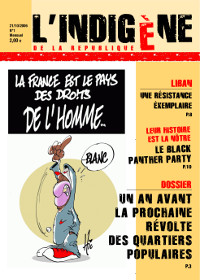When I say “we,” I mean this intermediate category between Whites and people of the Third World, that is, postcolonial subjects living in the West. Ancestors of colonized people and victims of structural racism in the North, they are despised, relegated, discriminated against but their burden is lessened, relatively speaking, because they enjoy the social, economic and political rights of liberal democracies. So I speak of “aristocratic indigenous people” not unlike those in white left movements who speak of “aristocratic laborers.” The first thing to do in order not to escape one’s conscience is to face reality in all its ugliness. And the first ugliness of this system is that none of us is innocent. But we are not guilty either because the world in which we live is a system that precedes us and will probably survive after us. We are not guilty, but we are responsible. We are responsible as human beings, we are responsible as third-people living in the North, and we are responsible as “potential” Muslims. In my view, it is based on this awareness and this objective situation in conflict with the Islamic principle of justice that we must forge politics. Here, I would like to introduce a distinction between social and political Muslims. The first are, in a large sense, cultural Muslims (they inherited Islamic culture because they were born in an Islamic environment—they practice or not or are converts) while the second are those who, in addition to having faith, are aware of their responsibility in a structurally unjust world. It is this second category that is the focus of my interest in this paper.
What Politics Should Be That of Muslims?
First, in my view, they should develop a materialist analysis of power. The power of which I speak is a global power, a system: modernity. Sadri Khiari speaks of modernity as “global history characterized by Capital, colonial/postcolonial domination, the modern State, and the hegemonic system of ethics that is associated to them.” No one can escape it, regardless of individual or collective will. Thus, if one is committed to a non-romantic and materialist analysis, the Islamic world is not an independent entity of this system. Islam is part of this world system and, more specifically, Islam, like any other civilizational tradition, is now prisoner of modernity. There is not, on one side, modernity with its own logic and, on the other side, Islam and its values. The two spheres are interlinked and they interact. In our material reality, Muslims, as individuals or community (or States with a Muslim majority) are determined, structured and dependent on Western imperialism and the economic system that underlies it: capitalism. The result of the structuring character of Western modernity is that every day, Islam is shaped by colonial modernity. Anything that evolves within it is condemned, corrupted. Islam is stuck in modernity like a mosquito in a spider web. Islam, not as transcendence, but as practice, cannot thus escape its own corruption.
Second, Muslims must be wary of the rhetoric on Islam’s reform. It is a question of method. To think that Islam needs reform is to think that the problem is Islam. To escape this dilemma, the other day, one of the speakers insisted on the distinction between the modern reform of Islam and “true” Islamic reform. The first supposedly submits to the West; its proponents seek to modernize Islam. The second purportedly proposes an alternative to the West and consists in Islamizing modernity. I contend that there is here a blind spot. From my point of view, we should neither modernize Islam nor Islamize modernity. We simply need to change paradigms, in other words, to engage in a strategy to end modernity. Therefore, given the challenge of modernity, given the corruption that we face, and given this modernity vs. Islam or East vs. West confrontation, three options are open to us.
Imitation through Fascination
The point here it to advocate for the aggiornamento of Islam, to promote an Islam of the Enlightenment, to accept the myths of modernity, and to integrate the idea that imperialist crimes since the discovery of America, genocides, and sociocides are mere accidents of history in the West. In this vision, the West’s criminal character is obscured. What most characterizes the West is its liberal democracy, the French Revolution, the State of rights, progress, technology, scientific discoveries, human rights, and Enlightenment philosophy. For these Muslims, the West is like a sun. For them, Islam must turn around it. Furthermore, it is important for Muslims who adhere to this idea to produce a discourse such that Islam matches this ideology of Enlightenment. The idea is for them to prove that Islam is a modern religion. This approach has its thinkers, its zealots. This is the Islam of Uncle Tom. Everyone knows an Uncle Tom around them: Ayaan Hirsi Ali, Fadela Amara, Salman Rushdie, Taslima Nasreen, Malek Chebel, Abdelwahab Meddeb, Hassen Chalghoumi, Djemila Benhabib… That said, if the representatives of Enlightenment Islam are often in the media, they are in fact in the minority, and this is why I will not dwell on this category which will end in the dustbin of history.
Integrationist Resistance
This is an indecisive movement. The idea here is to critique the West and its excesses, even fight it to death, but to respect its humanism, values and ideas, and even to be inspired by it. This movement proposes an alternative anti-imperialist and anticolonial model that, however, remains prisoner of the colonial matrix since the West is not apprehended as a totality. It is here that we find most of the 1960s independence movements in their secular (pan-Arabism, pan-Africanism, communism, socialism, Third World feminism) or religious form (reform movements that give rise to political Islam, Islamic feminism, all the way to the very recent gay liberation movements). Despite its heterogeneity, it is in this category that we find most Muslims (individually or collectively). I will therefore focus on four examples to illustrate this approach and show its limits. Let me clarify that these are rough descriptions, surely caricature-like, since reality is indeed much more complex.
a) Political Islam. Political Islam is for me one of the most relevant expressions of this category. It is the one that both resists and deals with modernity. Its greatness has been to propose a cultural model drawing from the dominant cultural standards of the Arab-Muslim world. Political Islam has proposed an alternative epistemic: the rejection of Western values and a return to its historical character to combat colonialism or despotic powers. This approach is justified, legitimate and fundamental when facing the bulldozer of modernity. But this represents only part of the task. Indeed, most movements associated to political Islam have not broken all ties to neoliberalism and imperialism—some are even allies. They thus fail to offer a credible alternative. As Hatem Bazian has mentioned, one cannot start a speech with “Bismillâh,” conclude with “al-hamdoulillâh,” and in between praise both Adam Smith and Wall Street. Again, I am conscious of presenting here a caricature since the so-called “Islamist” movements are extremely diverse and often opposed to each other. Some are radically anti-imperialist and conduct heroic battles while others are clearly puppets of local or imperialist powers. Overall though, they are stuck in a modernist matrix in the sense that they fail to promote alternative economic and social models or to escape from the imperialist octopus.
b) Leftist Movements from the Arab-Muslim World or the Third World. For such movements, it’s the opposite: they want to break free from capitalism but not from modernity’s epistemology and values. They want to be progressive but progressiveness is an integral part of Western modernity. This brings them to fight Islamist movements or even to ally with imperialist or local dictatorial powers in the name of progress and against archaism. This is how many Tunisian progressives have allied with Ben Ali to suppress Ennahda and how many Egyptian progressives have supported and legitimized General Abdel Fatah al-Sisi’s coup against Mohamed Morsi.
c) Islamic Feminism and Sexual Liberation Struggles as Products of Islam’s Reform. Let’s start with a revealing anecdote. The pioneers of feminism in the Islamic world are… men: Qasim Amin, Muhammad Abduh, Tahar Haddad, Taha Hussein… Most Muslim women commenting on this phenomenon see it as a welcome aspect, a sign of exceptional humanism, a kind of divine goodness. I have long been fascinated by this naivety. Why would men willingly abdicate their privileges; why on earth would they anticipate a struggle that would threaten their power over women? In Europe, early feminists were of course women. Why has the Arab world given life to such incongruity? As far as I am concerned, I see no mystery. Elites of these societies were already overwhelmed by the idea of their being “behind.” Women’s liberation, when preached by men, can in no way be explained by a pro-women tropism but more certainly by a complex experienced by indigenous individuals humiliated by colonial power and eager to catch up with the colonizer’s supposed standards. But in their haste to modernize their society, modernists or reformers forgot that they were not in the West and indeed that political structures, the organization of States, history, and therefore gender relationships, are not the same.
The effects of colonialism, then imperialism, and then the colonial counter-revolution (in its neoliberal form as far as gender relations are concerned) have not been adequately studied. I argue that in the South, both genders are oppressed in a dialectical way. Racialization of male sexuality highlights the barbarity of men towards women. It seems to me that a strictly feminist response that would focus on fighting Muslim archaism would be an analytical error. This is why, in my opinion, the lay feminisms of the South cannot provide a satisfactory answer. But it is the same for Islamic feminism since it assumes that Muslim men are having a sexist reading of the Koran (which is certainly true) while it silences the effects of neocolonialism in strengthening such patriarchal reading. What I mean here is that it is not so much the Koran and its reading that are influencing gender relations but the issue of the local power structure nested in transnational powers. An example: neoliberalism deconstructs families and social relationships, which leads many women in the South and especially in Muslim countries to prostitution. Do you really believe that a feminist reading of the Koran will stop prostitution? Who is naive enough to believe that? The other day, I was very annoyed by a man’s question: “Is the caliphate of women allowed in Islam?” To this question, a decolonial feminism would say three things:
We will ask the question when there will be a caliphate in the same way that we will ask whether a woman can become Queen of France when the monarchy will be restored.
Can a woman be President of France or the United States of America? The answer is: Yes, but it has never happened. Yet, both countries are beacons of civilization and rather escape sexist designation.
Is the female caliphate something claimed by Muslim women? Personally, I have never heard of it. I find rather suspect that, in Western democracies, the emphasis is so often on phantasm issues (i.e., women’s caliphate!) and never on the main issues likely to challenge the local rulers and their Western tutors.
d) Koranic Interpretation in Favor of Homosexual Liberation. Parallel to feminism, some reformists have incorporated the idea of the universality of homophobia, which would require the development of a Koranic interpretation in favor of the “liberation” of homosexuals—this when homosexual practices in our countries possess their own reality and historicity[1]. A decolonial reading of sexuality cannot lead to this simplistic idea. First, because homosexuality, as an identity phenomenon, is new: it is only a century old and was born in the West. From this point of view, and as a way to respect the diversity of practices, I think it is fundamental to oppose what Joseph Massad calls the “Gay International.” Second, because imperialism creates or reinforces the oppression of homosexuals in the South. Given that people understand the new Western norms of sexuality as as aggression, they start oppressing their country’s homosexuals who are attracted by such norms[2]. This is a new form of violence that cannot be fought with petitions but by removing its oppressive exogenous mechanisms[3] and by imagining political models within which freedoms are not necessarily guaranteed by the State but rather by the social body (this has long existed in Maghreb societies in the case of, for example, sexuality and religious practices). Here, a type of reformism that advocates for women’s or homosexual liberation and that adheres to white humanism plays a civilizing role. It is not by hiding behind a liberal reading of the Koran that it will be less a Trojan horse of “civilization.”
To say a last word on the category that concerns “resistance and integrationism” and whose proponents are the Third-World leftists, political Islam, Islamic feminism and sexual liberation movements, I want to specify that I am not considering such proponents as traitors. We are all to one degree or another in this second category. I my case, belonging politically to a third category, I am socially between the second and third categories for a reason that everyone will understand here. We, colonial subjects, non-whites, have lost “our historic personality.” And I am not among those romantics who think that we can retrieve any kind of authenticity. I repeat: we are caught in the nets as mosquitoes in a spider web. The only way to escape is partly to become Muslim in the sense that we cannot tolerate injustice, especially when we are objectively its accomplices. There remains only a third way.
The Break with Modernity (Or Western civilization)
This is a radical critique of the coloniality of power. It is the space of revolutionary Islam. Here, there will be no question of reformism because Islam and Muslims will never be the problem. I do not subscribe to this Orientalist view according to which it is the closing of the door of ijtihad that explains the “decadence” of the Muslim world. I do not adhere to the unfortunate concept of “colonizability” dear to Malek Bennabi (for whom I have otherwise great respect). The idea here is to attack the empire’s economic and military structures as well as coloniality of power, something most anticolonial movements have not done. The idea is also to expand the struggle and give it a global dimension. It is an entire civilization that must be challenged: a civilization that continues its murderous project in the South in the form of a colonial counter-revolution—neoliberalism has reached its limits even within its borders since the most vulnerable European countries are in a process of Third Worldization. Barbarism is at the gates of civilization. Obviously, we can make the more comfortable choice of the second way (i.e., resistance/integration) and deal with modernity. But our responsibility will always be there. We can never escape our consciousness or soothe it with “thawab” (good deeds). This is so because this civilization has continued to spread death, it continues its relentless work: see the Congo, Iraq, Afghanistan and Mali, see the planet’s destruction, see the dehumanization of social relations, see the economic crises, see the rise of fascism. See our guilt when we are passive or complacent. See our honor when we act to combat it. Personally, between dealing with it and breaking with it, my choice is made!
Houria Bouteldja, PIR Member
Traduit du français par Geneviève Rail.
Notes
[1] On this, read the excellent interview of Patrick Awondo: http://76crimes.com/2002/05/08/en-afrique-lhomosexualite-est-traditionnelle-mais/
[2] On this, read Houria Bouteldja’s “Universalisme gay, homoracialisme et «mariage pour tous»”: http://indigenes-republique.fr/universalisme-gay-homoracialisme-et-mariage-pour-tous-2/
[3] It should be noted that postcolonial States’ repressive measures against homosexuals are partly a relic of the colonial era.








